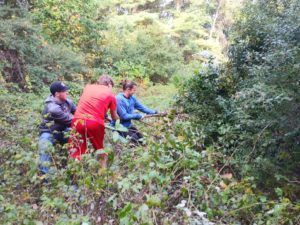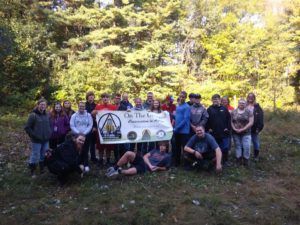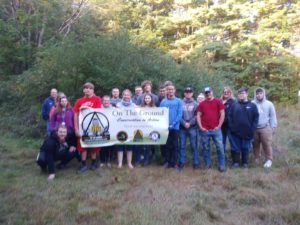OTG Jr. Partners with Lenawee ISD in Chelsea
On Wednesday, October 9, 21 students and three chaperones from Lenawee ISD came out to the Michigan Out-of-Doors (MOOD) Youth Camp in Chelsea to help improve native wildlife and pollinator habitat on camp property. The MOOD Youth Camp is located at Cedar Lake and is part of the Waterloo Recreation Area, and every summer hundreds of youth come through the camp to learn about natural resources and outdoor recreation.
located at Cedar Lake and is part of the Waterloo Recreation Area, and every summer hundreds of youth come through the camp to learn about natural resources and outdoor recreation.
Native wildlife habitat and pollinators are part of the education curriculum at camp, and there is a pollinator garden on camp property that is used to help introduce the campers to the importance of pollinators and their habitat. However, a large section of the pollinator garden and sections along the trail at camp had become crowded out by a grove of invasive autumn olive, and the students from Lenawee ISD decided that they would be able to help us take care of the problem.
After introducing the project and educating students about the ecology of the floral and faunal species they were impacting, the students wasted no time before beginning to tackle the invasive species in the pollinator garden. Using teamwork, students successfully removed the entire grove of autumn olive and an abundance of autumn olive along the trail. Before long, the students were ready for a break from the work and looking forward to lunch, and the last half hour before food was served was spent on the obstacle course at camp.
The students arrived at the lodge for lunch bright-eyed and laughing after the fun challenge of the obstacle course, and it wasn’t long before the five pizzas were devoured. During lunch, regional DNR Wildlife Biologist Denny Tison visited the students to discuss potential career pathways with the department and MUCC Camp Director Max Bass discussed summer employment opportunities at MOOD Youth Camp and careers in outdoor education. The students spent the remainder of the afternoon continuing their natural resources education at the Gerald E. Eddy Discovery Center near MOOD camp.
Thank you for another great OTG Jr. project, Lenawee ISD!

Volunteers from Lenawee ISD after the invasive autumn olive was removed.

Volunteers from Lenawee ISD in front of the invasive autumn olive they removed during the OTG Jr. project.
The post OTG Jr. Partners with Lenawee ISD in Chelsea appeared first on Michigan United Conservation Clubs.
Recent Posts



